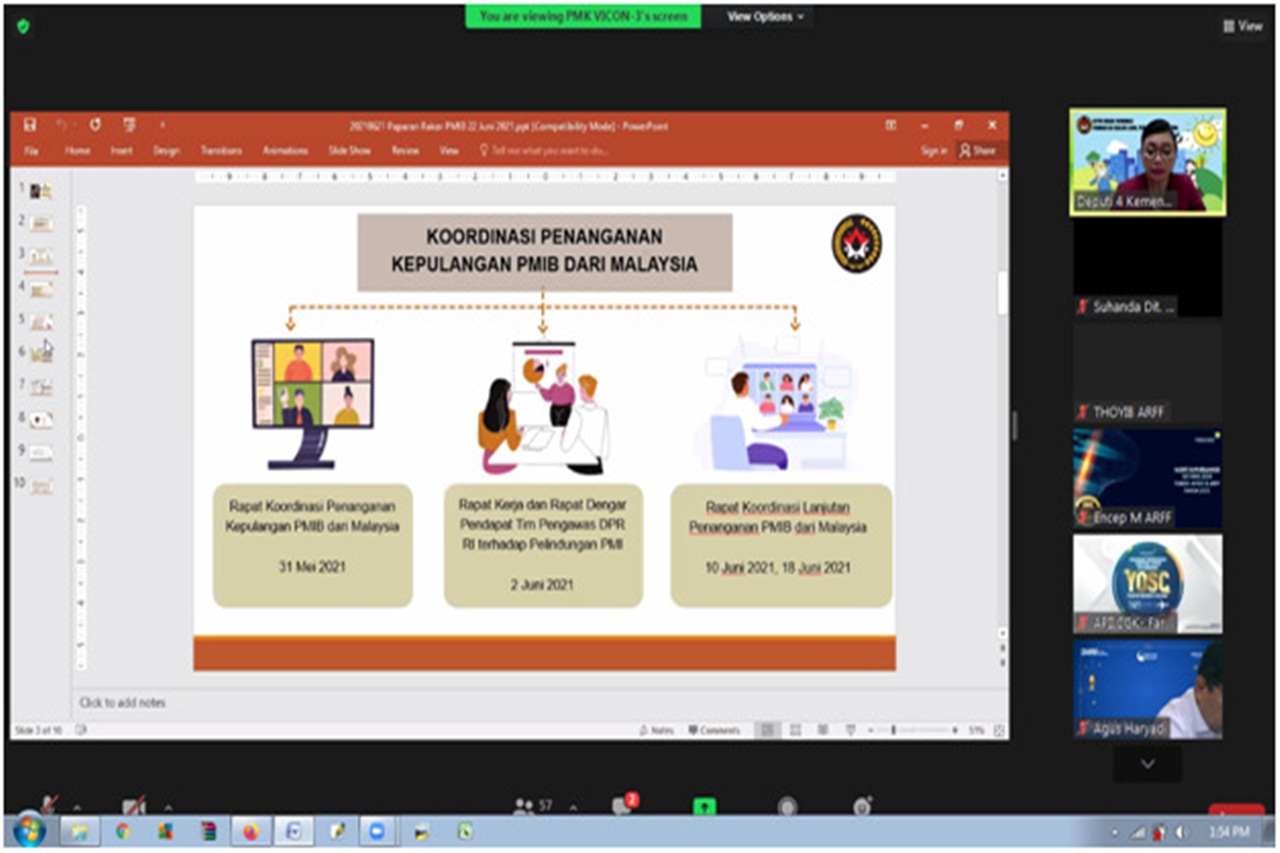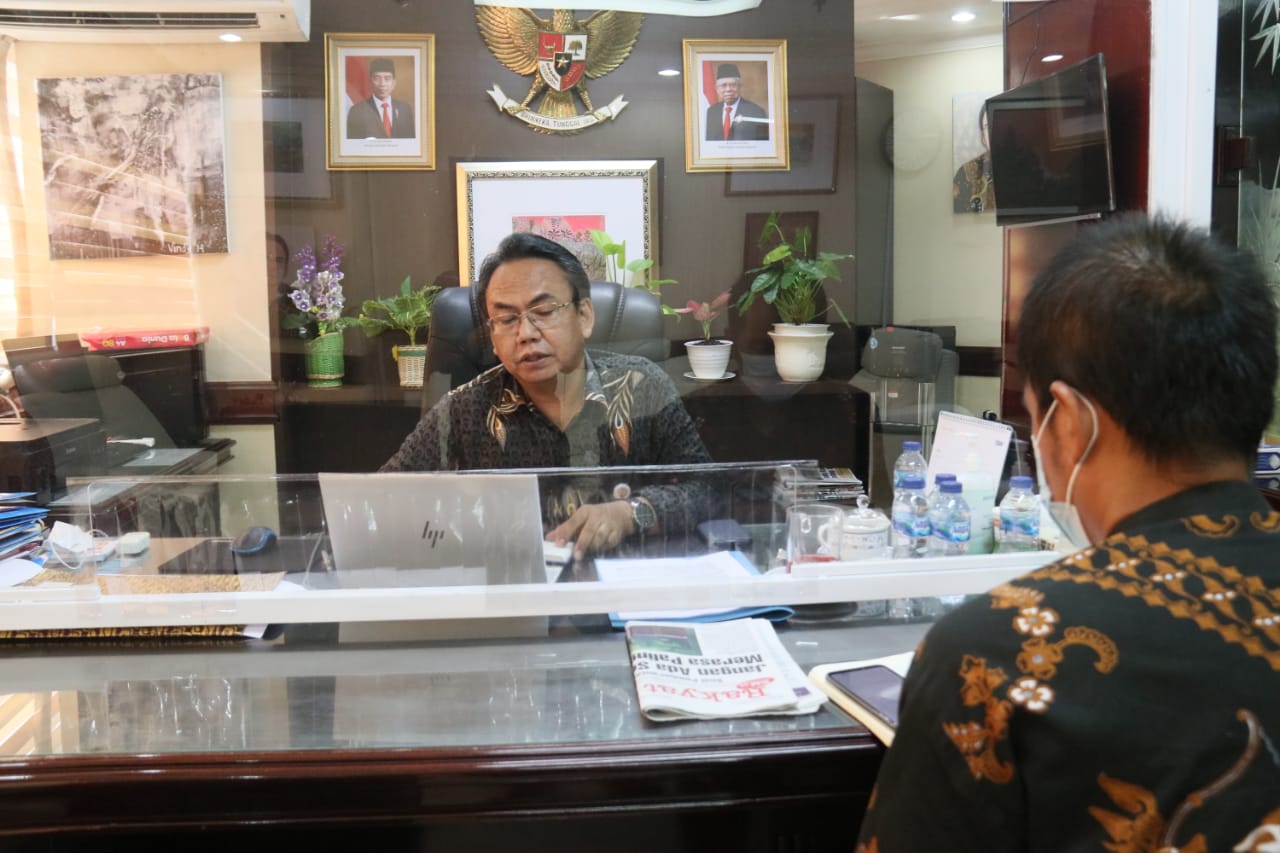JAKARTA
(June 22, 2021) - Director General of
Social Rehabilitation of the Ministry of Social Affairs Harry Hikmat attended
an online Coordination Meeting on the handling of the return of Troubled
Indonesian Migrant Workers (PMIB) from Malaysia which was organized by the
Coordinating Ministry for Human Development and Culture.
In this follow-up coordination meeting, we
discussed the final preparations for the repatriation of PMIB for vulnerable
and troubled groups from Malaysia. The priority for returning PMIB is currently
addressed to deportees from vulnerable groups (ill, pregnant, elderly, women
and children).
The repatriation of PMIB is planned to be
carried out in 2 phases. Phase I on June 24, 2021, as many as 145 deportants
consisting of 92 men and 53 women. Of the 145 deportants, 138 were sick, 3
mothers with children, 3 babies, and 1 elderly. The second phase of 148
deportants who will be repatriated on 27 June 2021, consisting of 73 men and 75
women. Of the 148 deportants, there were 113 sick people, 11 mothers, 9 children,
11 elderly and 4 pregnant women. All deportants have undergone PCR swabs with
negative results.
These deportants will be flown directly from
Kuala Lumpur Airport, Malaysia to Soekarno Hatta Airport, Tangerang. They will
then undergo a 5-day quarantine period at the Kemayoran Athlete's Wisma
Pademangan, Jakarta before being sent back to their hometown.
PMIB comes from various regions in Indonesia,
including from the provinces of West Nusa Tenggara, North Sumatra, East Java,
West Java, Riau Islands, East Nusa Tenggara, and 13 other provinces.
At the follow-up meeting on the handling of
PMIB's return from Malaysia, Director General of Social Rehabilitation Harry
Hikmat said that the Minister of Social Affairs Tri Rismaharini had sent a
letter to the Minister of Foreign Affairs regarding requests for data by name
by address for the area of origin of troubled Indonesian Migrant Workers.
"The data for the first phase has been
shared by the Ministry of Foreign Affairs, then we hope we can get the data for
the second phase," said Harry Hikmat. It is hoped that before returning to
the area of origin, the data can be obtained so that it can be communicated
with the Regional Government through the local Social Service.
According to the Director
General of Social Rehabilitation, if the address is unclear, the local
government will also experience difficulties in picking it up and will not
allow it to be delivered to the PMIB's family/relative's house.
Finally, they only drop off
at the existing district/city terminals, thus creating the risk of being picked
up again by illegal TKI companies that are already waiting for PMIB to return
to their area of origin.
“To avoid that, we hope to
obtain a clearer address. If we do not get clear data on the area of origin
by the time specified, during the quarantine period we can re-identify
together. The Ministry of Social Affairs team can conduct an assessment to get
a clear address, “explained Harry Hikmat.
Furthermore, Harry Hikmat
emphasized that during the quarantine period, PMIB must be ensured that PMIB is
not exposed to Covid-19, it is also ensured that there are medical actions
needed for PMIB who are sick. If they have a serious illness, then they need
further medical treatment, so that they are in a better condition when they are
returned to their hometown.
The next step, Harry Hikmat
conveyed that the Minister of Social Affairs sent letters to governors in 19
provinces, and copied them to the regents or mayors of the PMIB's regions of
origin with data for each province attached. The letter states that there will
be the repatriation of PMIB at the end of June 2021, so that there is time for
the local government so that the PMIB pick-up process is not hampered.
"We have also prepared
a PMIB transit post at RPTC (Save House) Bambu Apus, Mulya Jaya Training Center
at Pasar Rebo and Panasea Center at Bambu Apus which are possible as transit
points if PMIB encounters obstacles in repatriation," explained Harry
Hikmat.
Before being sent home,
Harry Hikmat suggested that PMIB who do not have a complete identity card is possible for a 5-day quarantine, a team from the Directorate General of Dukcapil
(Civil Registry and Population) be brought in so that they are confirmed to be
recorded in the population data administration system, to avoid identity
falsification upon departure to Malaysia beforehand.
The Ministry of Social
Affairs is also ready to assist if they arrive in a neglected state
or there is a rejection from their families due to poor conditions, including
PMIBs who have or are infected with infectious diseases, thus getting
stigmatized from their families and the environment around where they live and
are refused to enter their own villages.
“We have prepared letters
to all Social Rehabilitation Centers, so that it is possible to make referrals
or assist PMIs who have problems or are neglected or have
problems when they return home. Social workers will assist, until
it is confirmed that they can stay or return with their relatives or
families," said Harry Hikmat.
The return of the
deportants is part of the Malaysian law enforcement process. The role of the
Government of Indonesia is to facilitate safe and smooth returns. Many of the
deportants have lived in depots (immigration detention centers) beyond their
prison term, with poor conditions. This creates humanitarian problems for
individuals, especially vulnerable groups.
Returning has passed health
procedures, PCR tests, quarantine, and coordination with all relevant ministries
and institutions to reduce potential imported cases. After returning to the
area of origin, they can continue to self-quarantine for 14 days.
The Coordination Meeting
for Handling the Return of Troubled Indonesian Migrant Workers from Malaysia
was chaired by the Deputy for Coordination for Quality Improvement of Children,
Women, and Youth at the Coordinating Ministry for Human Development and Culture
Femmy Eka Kartika Putri and attended by representatives from other
Ministries/Institutions including the Ministry of Foreign Affairs, BP2MI,
Ministry of Health, Ministry of Transportation, Ministry of Home Affairs, TNI,
Polri, PT Angkasa Pura II.
 Bahasa
Bahasa
 English
English



